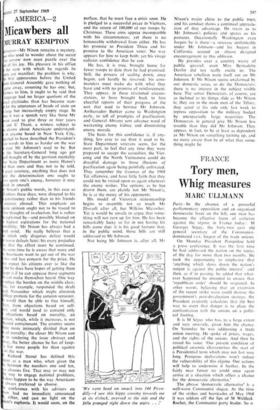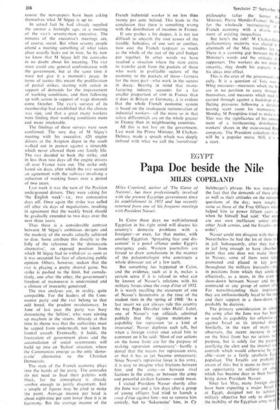FRANCE
Tory men, Whig measures
MARC ULLMANN
Paris—In the absence of a powerful parliamentary opposition and an organised democratic force on the left, one man has become the effective focus of criticism against the regime in France today: M Georges Seguy, the forty-two year old general secretary of the Communist- dominated cur, largest of the trade unions.
On Monday President Pompidou held a press conference. It was the first time he had addressed the nation on the topics of the day for more than two months. He took the opportunity to emphasise that 'anything which slows down the nation's output is against the public interest*- and then, as if in passing, he added that what- ever happened he intended to ensure that 'republican order' should be respected. In other words, believing that an extension of the recent strike wave could destroy the government's post-devaluation strategy. the President evidently calculates that the best way to avert that danger is to place the confrontation with the unions on a politi- cal footing.
It is M Seguy who has, to a large extent and very unwisely, given him the chance. On Saturday he was addressing a trade union meeting. He spoke of prices, wages. and the rights of the unions. And then he raised his voice. 'Our present condition of political anaemia characterises the start of a Presidential term which may not last very long. Pompous declarations won't reduce the vulnerability of this regime. Our actions will help to undermine it further. In the fairly near future we could once again arrive at a situation which offers a chance for the democratic alternative.'
The phrase 'democratic alternative' is a well-worn Communist slogan. At the time of the strikes and barricades of May 1968 it was seldom off the lips of M Waldeck. Rochet, the Communist party leader. So o: course the newspapers have been asking themselves what M Seguy is up to.
In actual fact he had already supplied the answer a fortnight ago, at a meeting of the CGT'S seventy-man executive. The minutes of the executive's meetings are, of course, secret. But when seventy people attend a meeting something of what takes place usually leaks out in time. So by now we know that M Seguy left the comrades in no doubt about his meaning. The CGT must avoid any general confrontation with the government, but at the same time it must not give it a moment's peace. In terms of tactics this meant the proliferation of partial strikes, starting with action in support of demands for the improvement of working conditions, and then following up with action in support of wage demands come October. The cur's surveys of its membership had established that the climate was ripe, and that a great many workers were finding their working conditions more and more intolerable.
The findings of these surveys were soon confirmed. The very day of M Seguy's meeting with his executive, 420 engine drivers at the Avignon depot in the south walked out in protest against a timetable which never allowed them any family life. The COT decided to back the strike, and in less than two days all the engine drivers all over France were out. The strike only lasted six days, after which the cur secured an agreement with the railways involving a reduction of working hours over a period of two years.
Last week it was the turn of the Parisian underground drivers. They were asking for `the English week'—i.e., two consecutive days off. Once again the strike was called off after six days of negotiations, resulting in agreement that the weekly break should be gradually extended to two days over the next three years.
Thus there is a considerable contrast between M Seguy's ambitious designs and the modesty of the results actually achieved to date. Some attribute this directly to the folly of the reference to the `democratic alternative', an exposed position from which M Seguy had to withdraw as soon as it was occupied for fear of alienating public opinion. Others, however, reckon that the CGT is playing a pretty shrewd game. No strike is pushed to the limit, but cumula- tively, one after the other, the government's freedom of manoeuvre is undermined and a climate of insecurity generated.
The two analyses are, in reality, quite compatible. For the leaders of the Com- munist party and the COT belong to that odd breed, the prudent revolutionary. In June of last year the party was busy denouncing the 'leftists', who were stirring up mayhem in the streets. Already at that time its theme was that the authorities must be sapped from underneath, not taken by frontal assault. Eventually, it holds, the frustration of government plans and the accumulation of social resentments will build up into an 'Italian' situation, where the Communists emerge as the only 'demo-
cratic' alternative to the Christian Democrats.
The state of the French economy plays into the hands of the party. The comrades do not need to load their palettes with black, for the atmosphere is already sombre enough to justify discontent. Just a couple of figures may be cited to make the point. Average income per head is about eight-nine per cent lower than it is in Germany. But the average income of the French industrial worker is no less than twenty per cent. behind. This leads to the conclusion that there is something wrong with the distribution of incomes in France.
If one probes a bit deeper, it is not too difficult to unearth the root causes of the trouble. Subsidies, of one sort or another, now cost the French taxpayer as much as the whole of the rest of the civil budget put together. In other words we have reached a situation where the state exists to transfer cash from the pockets of those who work in profitable sectors of the economy to the pockets of those—farmers for the most part—who work in the sectors in decay. Bearing in mind that manu- facturing industry accounts for a far smaller proportion of GNP in France than it does in Britain or Germany, it is evident that the whole French economic system is based on the inadequate remuneration of industrial workers—all the more so in that salary differentials are on the whole greater in France than in neighbouring countries.
All this is not lost on the government. Last week the Prime Minister, M Chaban- Delmas, made a speech which was deeply imbued with what we call the `mendesiste'
philosophy (after the former pl.; Minister, Pierre Mendes-France). He eat for the wholesale 'restructuring' of French economy with a drastic cur ment of existing inequalities.
But here's the rub! M Chaban-Del parliamentary majority was elected in aftermath of the May troubles last There is a yawning gap between the Pr Minister's words and the attitudes of supporters. The workers do not doubt sincerity, they doubt his capacity to his ideas into effect.
This is the crux of the government's d culty. It is a question of Tory men Whig measures—measures which the N% are in no position to carry through themselves, and measures which need to carried through against a backdrop of flitting pressures following a devaluat leaving scant room for manoeuvre. Monday M Pompidou tried to make a st This was the significance of his annou ment of a forthcoming distribution workers' shares in the state-owned Re company. The President calculates that will be a popular move. Still, it k a start.







































 Previous page
Previous page